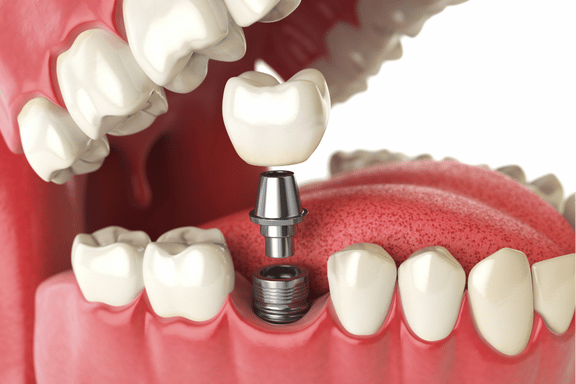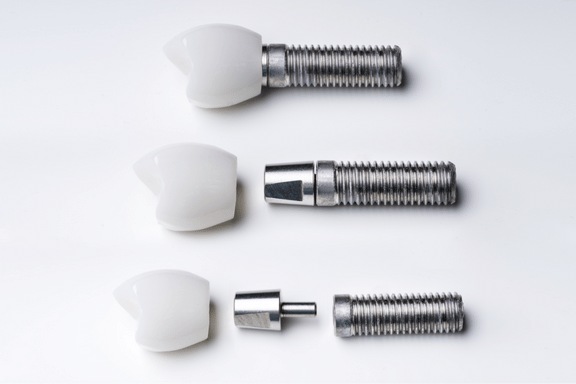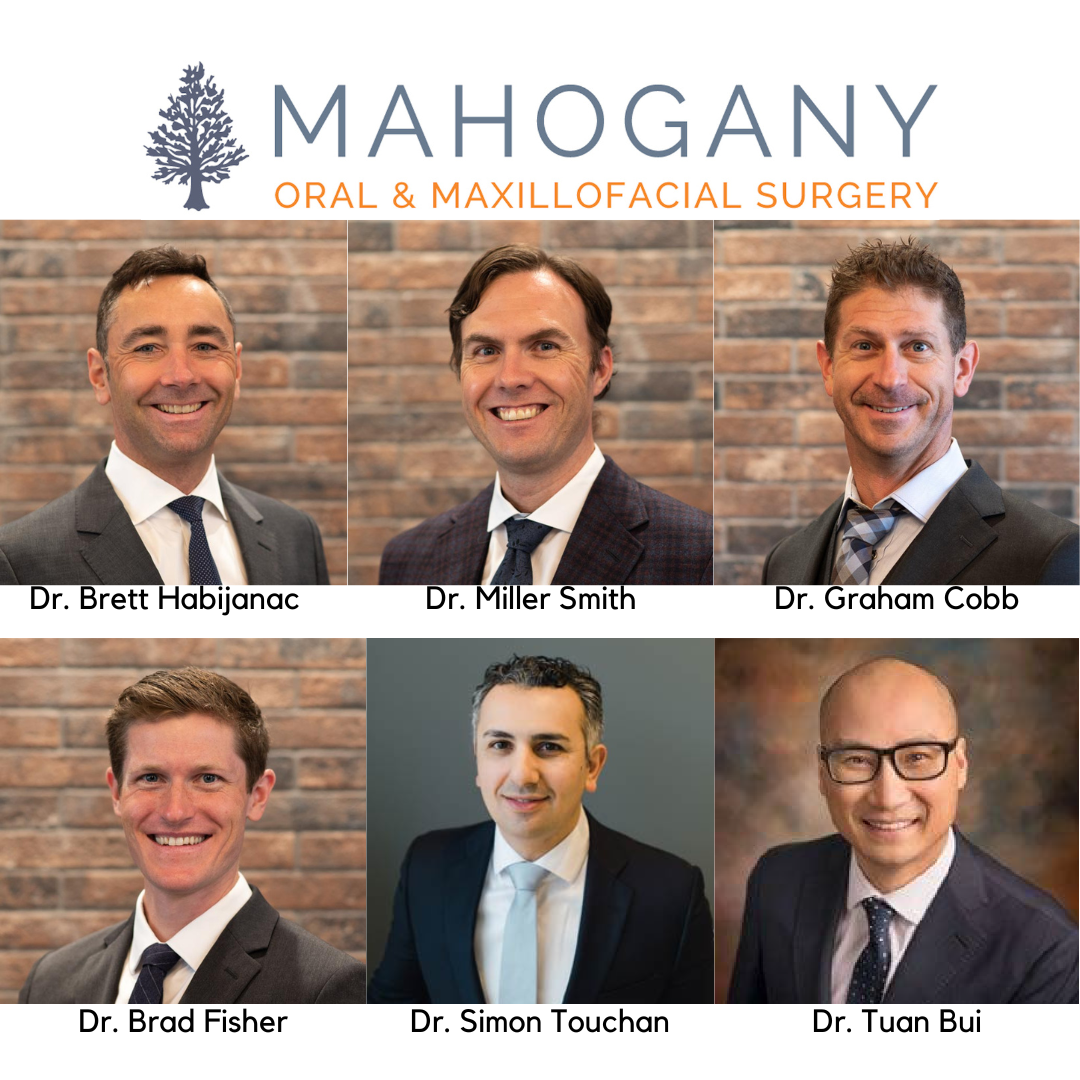


If you’ve ever wondered, “What are dental implants made of?”, you’re not alone. Dental implants are a popular and effective solution for missing teeth, providing both functional and aesthetic benefits. But what exactly goes into creating these artificial tooth roots that are so critical in modern dentistry?
At Mahogany Oral Surgery in Calgary, we specialize in dental implant surgery, helping patients in SE and SW Calgary, as well as surrounding communities, regain their smiles.
We’ll break down the materials used to create implants, why you might consider them, and what the entire dental implant process entails.
Why Dental Implants Matter: The Future of Tooth Replacement

Imagine your teeth as the bricks of a sturdy house, and your jawbone as the foundation. When one brick crumbles (or in this case, a tooth), it weakens the entire structure.
This is where dental implants come in. These prosthetic roots act as a replacement foundation, giving your mouth the support it needs to function naturally.
The global dental implant market is predicted to reach $13 billion by 2023, highlighting the increasing demand and relevance of dental implants.
You may be wondering: What are dental implants made of, and why are they so effective? The short answer is that most implants are made from highly durable, biocompatible materials like titanium and zirconia.
These materials mimic your natural tooth roots and integrate with the jawbone, making them a reliable long-term solution for replacing one or more teeth.
What Are Dental Implants Made Of? The Key Materials Behind Tooth Implants

When discussing implants, the first question that often arises is, what are dental implants made of?
The most commonly used materials in dental implants are:
- Titanium Implants: This metal is the gold standard in implant dentistry because of its strength, light weight, and ability to fuse with bone through a process called osseointegration. Titanium implants have been used for decades and are considered extremely reliable.
- Zirconia Dental Implants: As an alternative to metal, zirconia is gaining popularity due to its aesthetic appeal and metal-free composition. Zirconia dental implants are particularly beneficial for patients with metal allergies or those looking for a more aesthetic appearance.
These materials ensure the implant is biocompatible, meaning your body accepts them without adverse reactions.
Whether you opt for titanium implants or zirconia implants, both materials offer the strength and stability needed to restore your smile.
The Benefits of Dental Implants Over Traditional Methods
You’ve probably heard about dentures and bridges, but have you ever wondered why so many people are now opting for dental implants instead? Implants offer several advantages over traditional tooth replacement methods like dentures or bridgework.
- Permanent Solution: Unlike dentures, which need to be replaced periodically, implants are designed to last a lifetime with proper care.
- Natural Look and Feel: Since dental implants are anchored directly into the jaw bone, they mimic the function of your natural teeth roots and feel more like real teeth than dentures.
- Bone Preservation: When you are missing a tooth, the jawbone in that area of your mouth begins to deteriorate. Dental implants help preserve the bone, preventing further damage.
- No Impact on Surrounding Teeth: Unlike bridges, which rely on adjacent teeth for support, dental implants don’t affect your other teeth.
If you’re deciding between dentures and implants, consider the long-term benefits like bone preservation and a more natural appearance.
Ideal Candidates for Dental Implants: Who Can Benefit the Most?

Dental implants are a popular solution for individuals with missing teeth, but not everyone is a good candidate. To determine if you’re an ideal candidate for implants, consider the following factors:
- Age: Dental implants can be suitable for individuals of all ages, but the ideal candidate is typically over 18 years old, when the jawbone has fully developed.
- Jawbone Density: A sufficient amount of jawbone density is necessary to support the implant. If the jawbone is too thin or soft, bone grafting may be required.
- Gum Health: Healthy gums are essential for the success of dental implants. Individuals with gum disease or other oral health issues may need to address these problems before undergoing implant surgery.
- Overall Health: Certain medical conditions, such as diabetes or osteoporosis, may affect the healing process or the success of the implant. It’s essential to discuss your medical history with your dentist or oral surgeon.
- Smoking Habits: Smoking can negatively impact the healing process and increase the risk of implant failure. Quitting smoking or reducing smoking habits can improve the chances of a successful implant.
If you’re missing one or more teeth, dental implants can be a life-changing solution. They can restore your natural smile, improve your confidence, and enhance your overall quality of life. At Mahogany Oral Surgery, we carefully evaluate each patient to ensure they are ideal candidates for implants, setting the stage for successful outcomes.
The Dental Implant Process: What to Expect from Start to Finish

Now that you understand what are dental implants made of, you may be curious about the dental implant process. Here’s a step-by-step guide to help you know what to expect.
- Consultation and Planning: At Mahogany Oral Surgery, the journey begins with a thorough examination by one of our expert oral and maxillofacial surgeons. We’ll evaluate your jaw bone structure, review your medical history, and discuss any relevant medical conditions.
- Bone Grafting (if necessary): If your jaw bone has deteriorated, a bone graft may be required to provide a sturdy foundation for the dental implant. This is more common in patients who have been missing teeth for a long time.
- Surgical Placement of the Implant: During the surgery, a titanium implant or zirconia implant is inserted into the jawbone. This procedure is performed under local anesthesia, and most patients report minimal discomfort.
- Healing and Osseointegration: Over the next few months, the implant fuses with the bone in a process called osseointegration, ensuring a solid foundation for the prosthetic tooth.
- Abutment Placement: Once the implant has successfully integrated with the bone, the connector piece called an implant abutment is attached. This abutment will hold the dental crown or replacement tooth.
- Placing the Dental Crown: Lastly, a custom-made dental crown is attached to the abutment, completing the dental implant process. The replacement tooth will blend seamlessly with your natural teeth.
Caring for Dental Implants: Ensuring Longevity and Health
Dental implants are designed to last for several years, but proper care and maintenance are essential to ensure their longevity and health. Here are some tips to help you care for your implants:
- Brush and Floss Regularly: Brush your teeth at least twice a day with a soft-bristled toothbrush and fluoride toothpaste. Floss once a day to remove food particles and plaque from between your teeth and around your implants.
- Visit Your Dentist Regularly: Regular dental check-ups are crucial to monitor the health of your implants and surrounding teeth. Your dentist can detect any potential problems early on and provide necessary treatment.
- Avoid Hard or Sticky Foods: Avoid eating hard or sticky foods that can damage your implants or surrounding teeth. Opt for soft, nutritious foods that are easy to chew.
- Don’t Smoke: Smoking can negatively impact the healing process and increase the risk of implant failure. Quitting smoking or reducing smoking habits can improve the chances of a successful implant.
- Clean Your Implants: Use a soft-bristled toothbrush and mild soap to clean your implants. Avoid using harsh chemicals or abrasive materials that can damage the implant surface.
By following these care and maintenance tips, you can ensure the longevity and health of your implants and enjoy a beautiful, natural-looking smile for years to come. At Mahogany Oral Surgery, we provide comprehensive aftercare instructions to help you maintain your dental implants and keep your smile in top condition.
Why Choose Mahogany Oral Surgery for Your Dental Implants?

With so many dental providers offering dental implants in Calgary, why should you choose Mahogany Oral Surgery?
- Experienced Oral Surgeons: Our team of oral and maxillofacial surgeons specializes in complex cases, ensuring you’re in expert hands throughout the dental implant process.
- State-of-the-Art Technology: We use the latest advancements in implant dentistry, from 3D imaging to precise implant placement techniques, ensuring your procedure is as smooth and successful as possible.
- Comprehensive Care: Whether you need a simple tooth replacement or a more complex procedure like bone grafting, we offer a full range of services to meet your needs.
- Personalized Treatment: Every patient is unique, which is why we tailor our treatment plans based on your individual circumstances, including your medical history and aesthetic preferences.
Dental Implant Materials: Why Titanium and Zirconia Lead the Way
Now that we’ve explored the implant process, let’s revisit the key question: what are dental implants made of?
As mentioned earlier, the two primary materials used in dental implants are:
- Titanium Implants: Known for their strength and ability to integrate with the bone, titanium dental implants are a time-tested solution.
- Zirconia Implants: For patients with metal allergies or those seeking a more aesthetic appearance, zirconia dental implants offer a metal-free alternative.
Both materials are incredibly durable and have high success rates. However, titanium alloy remains the most widely used due to its long track record and high compatibility with bone tissue.
Conclusion: Invest in Your Smile with Dental Implants

At Mahogany Oral Surgery, we believe that every patient deserves a smile they can feel confident about.
Whether you’re missing one tooth or many, implants offer a reliable, long-term solution that looks and feels like natural teeth.
So, what are dental implants made of? They’re crafted from biocompatible materials like titanium and zirconia, designed to mimic your natural tooth roots and provide a strong, stable foundation for artificial teeth.
These materials ensure that your implants not only restore your smile but also preserve your jawbone and overall oral health.
Ready to take the next step? Book a consultation with us today, and let’s discuss how dental implants can improve your quality of life. Your new smile is just a phone call away!


